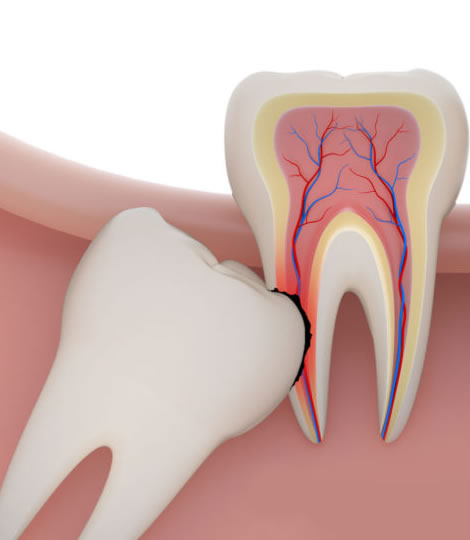Exploring Different Sedation Options for a Comfy Knowledge Teeth Extraction Experience
The usage of sedation during such treatments has become increasingly typical to reduce anxiousness and discomfort. With a variety of sedation choices readily available, from neighborhood anesthesia to general anesthetic, each method offers differing degrees of relaxation and discomfort control.
Neighborhood Anesthetic
Regional anesthesia is a commonly used method for numbing specific areas of the mouth during knowledge teeth extraction procedures. By administering an anesthetic, such as lidocaine, a dental practitioner can guarantee that the patient continues to be pain-free and comfy throughout the extraction procedure. Local anesthesia works by momentarily obstructing the nerves in the mouth, stopping them from sending discomfort signals to the brain. This allows the dental expert to do the removal without triggering any discomfort to the patient.
Among the primary benefits of neighborhood anesthesia is its targeted numbing impact, which suggests that only the certain area being treated is impacted. This localized strategy minimizes the risk of systemic adverse effects and enables for a quicker healing post-procedure. Furthermore, neighborhood anesthesia is thought about to be a risk-free and regular practice in dental care, with minimal threats involved when provided by a trained specialist.
Nitrous Oxide
Nitrous oxide, commonly understood as giggling gas, is a kind of sedation commonly made use of in dental care to assist people kick back throughout dental procedures. This sedation alternative permits the person to continue to be conscious and receptive throughout the treatment while feeling at simplicity and comfy.
Additionally, nitrous oxide is recognized for its fast healing time. When the mask is removed, the impacts of the gas disappear rapidly, enabling individuals to resume their regular tasks without lingering sedative impacts. This makes laughing gas a practical selection for those that require to drive themselves home after the dental appointment. Moreover, laughing gas is appropriate for clients of all ages, making it a versatile sedation alternative for knowledge teeth removals and other dental treatments.
Oral Sedation
Oral sedation, a medicinal technique employed in dental care, includes the administration of sedative medications by mouth to induce a kicked back state throughout oral treatments. This kind of sedation is generally made use of for patients undergoing wisdom teeth extraction to minimize anxiety and discomfort. The medications recommended for dental sedation come from a class of medicines called benzodiazepines, which have sedative, anxiolytic, and amnesic residential properties. Typically, the patient takes the suggested drug before the treatment, allowing sufficient time for the sedative results to hold.
Unlike intravenous sedation, dental sedation does not call for shots or needles, making it a more comfortable alternative for individuals with an anxiety of needles. Additionally, oral sedation is considered safe and efficient when provided by trained dental professionals.
IV Sedation
Provided intravenously by skilled doctor, IV sedation is a powerful method utilized to cause a regulated state of deep leisure and unconsciousness throughout dental procedures. Unlike oral sedation, which can be uncertain in its effects, IV sedation permits for precise control over the degree of sedation, making it an optimal choice for intricate treatments like wisdom teeth extractions.
Throughout IV sedation, a sedative medicine is delivered straight into the bloodstream with a blood vessel, permitting it to take effect quickly and successfully. This technique ensures that the individual continues to be not aware and comfy of the treatment while still preserving important functions such as breathing and heart rate.
One of the primary advantages of IV sedation is its capacity to supply a deeper level of sedation Our site compared to other techniques, making it especially ideal for individuals with high levels of anxiousness or those undergoing substantial dental work (wisdom teeth removal aspendale). my response Additionally, the results of IV sedation commonly subside progressively after the treatment, lowering the likelihood of grogginess or lingering negative effects. Generally, IV sedation provides a efficient and risk-free alternative for ensuring a comfortable and stress-free experience throughout knowledge teeth extraction

General Anesthetic
Having gone over the benefits of IV sedation for wisdom teeth removal, the use of basic anesthetic provides a different option for patients requiring a deeper degree of unfamiliarity during dental procedures. General anesthetic generates a regulated state of unfamiliarity, making certain the client really feels no pain or pain during the removal procedure. This approach is particularly valuable for individuals with extreme oral anxiety, complex medical demands, or those going through multiple extractions simultaneously.
General anesthetic is administered by an experienced anesthesiologist who carefully keeps track of the person's important indications throughout the procedure. It involves using intravenous drugs or breathed in gases to induce a state of unfamiliarity. While under general anesthesia, the client will not understand the surgical procedure, experience any type of pain, or have any kind of recollection of the treatment later.
Although basic anesthetic is risk-free when administered by qualified experts, it carries a slightly higher threat contrasted to various other sedation choices - wisdom teeth removal aspendale. Individuals taking into consideration basic anesthetic for knowledge teeth removal must go over the possible threats and advantages with their dental expert or dental specialist to make a notified choice based on their specific requirements and case history

Final Thought
In final thought, different sedation options are offered to make sure a comfortable knowledge teeth extraction experience. Neighborhood anesthetic is frequently utilized for numbing the particular area, while nitrous oxide offers relaxation and this contact form pain relief. Dental sedation and IV sedation deal deeper degrees of relaxation, relying on the individual's demands. General anesthetic can be used for a lot more intricate situations. It is essential to speak with your dental professional or dental cosmetic surgeon to establish the most suitable sedation option for your procedure.
Nitrous oxide is ideal for individuals of all ages, making it a versatile sedation choice for knowledge teeth extractions and various other dental treatments.
